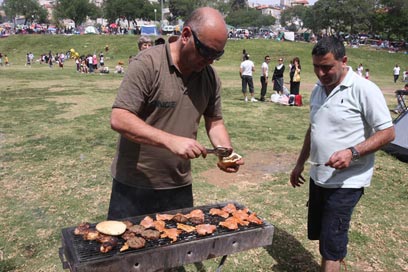
Israelis recruited to PR Corps
If reserve military duty wasn't enough for them, Israeli tourists are invited to join efforts to improve State's image abroad. Ministry of Information launches campaign, complete with training centers. Remember: Israel developed cherry tomatoes
At a party in Goa, on the top of the Eiffel Tower, in the streets of Manhattan, in the jungles of Brazil or in a Dubai hotel – you can never know when an Israeli tourist will come across prejudice and negative impressions of his distant homeland, but it's pretty certain it'll happen at some point. Now we'll all have a response ready.
"Sick of how they see us abroad? You can do something to change the picture" – this is the slogan aimed at all Israeli citizens who go abroad. The Ministry of Information and Diaspora has launched an advertising campaign which includes setting up a website, distributing booklets to Israelis taking off at Ben-Gurion Airport, and coaching courses for official delegations – the first public diplomacy campaign in Israel's history.
During recent months the anti-Israel wave has increased around the world, reaching verbal and even physical violence at times. Arrest warrants against Israeli politicians, anti-Semitic events and disturbances during lectures given by Israeli officials – our representatives have seen it all.
Only last week, there were disturbances at lectures given by Deputy Foreign Minister Danny Ayalon in Oxford, UK, and Israel's ambassador to the US, Michael Oren, in the University of Southern California.
A survey carried out for the Ministry of Information and Diaspora under MK Yuli-Yoel Edelstein (Likud) revealed that 91% of Israeli citizens believe that Israel's image abroad is extremely negative. Some 85% were ready to join the effort to improve this image.
What can be done? The new project, launched Wednesday, aims to train citizens to be Israel's PR representatives. As part of the project, an extensive media campaign is underway to encourage Israelis to enter the website www.masbirim.gov.il and learn how they can help.
The Ministry will also distribute booklets containing most of the information available on the website to the three million Israelis going abroad each year. Israeli airlines El Al, Israir and Arkia have agreed to distribute the leaflets too.
The booklet begins, "Before you fly, allow us to tell you about the project, "Explaining Israel". How many times have you come across information about Israel that is nowhere near the truth? Probably many times. Now's the time to help."
Among other things, the booklet explains how to get important messages across. "Personal stories, feelings and experiences – share them. We're all human. Present new points of view – it's worth noting that each side has its own version of events. Speak concisely – long speeches are likely to lose your audience's interest. Clear sentences aid understanding. Use humor – it always helps."
If you want to impress your audience, you can present a number of positive items: Israel is the only state in the world in which the number of trees has not fallen in the 21st century. Israeli inventions: Drip irrigation systems, a system for beaming pictures from space back to the earth, desert agricultural techniques, and much more. And the grand finale: Israel developed the most popular varieties of cherry tomatoes.

Camel most common form of transport? (Photo: Shlomo Eran)
The website also details myths about Israel common abroad and the real situation in contrast.
One such myth: "Israel is a huge country", and the appropriate response: "Not true. Israel is one of the smallest states in the world. India is 150 times bigger, Germany 16 times, and Italy 13 times. Israelis make up just one thousandth of the world's population."
Another example: "Israelis don't really want peace," and the suggested rejoinder: "Not true. Despite seven wars and terror that has continued for more than six decades, Israel has made huge concessions for the sake of peace with its neighbors Egypt and Jordan."
Edelstein told Yedioth Ahronoth on Tuesday, "In light of Israel's negative image abroad, the Ministry of Information and Diaspora understood that in response to the vast sums invested by Arab states in their propaganda against us, we have to recruit our human capital – Israel's citizens."
Why do Israelis have barbeques?
The campaign was planned after extensive research using surveys and focus groups. One part of the campaign includes three television clips which present the problem of Israel's image in a humorous manner.In one clip, a British TV presenter tells viewers that the camel is the most common form of transport in Israel, used for transporting goods, water, riders and ammunition in the desert. In another clip, a Spanish journalist says that Israel has no modern means of cooking, which is why residents have barbeques in the park.

No modern means of cooking? (Photo: Gil Yohanan)
Some of the content of the booklet is likely to raise differences of opinion even among Israelis. The booklet notes proudly that minority rights of Arab Israelis are respected, and as proof of this presents Rana Raslan – the Arab Israeli woman who won Israel's 1999 beauty contest. Key moments in Israel's history are presented, including the Balfour Declaration, the Eichmann trial and Israel's wars side by side with successes in the Eurovision Song Contest and European basketball, as well as the field hospital in Haiti following that country's devastating earthquake.
The Ministry has also set up information centers around the country which will hold coaching workshops, adjusted to suit the group being trained. Various groups will be invited to take part including ministers, MKs, diplomats, military officers, businesspersons, guides, celebrities, sportspersons and youth group delegations.
Private individuals who go abroad often can also benefit from professional training in various centers. It is hoped that thousands will undergo training, which is offered by the company Debate.










